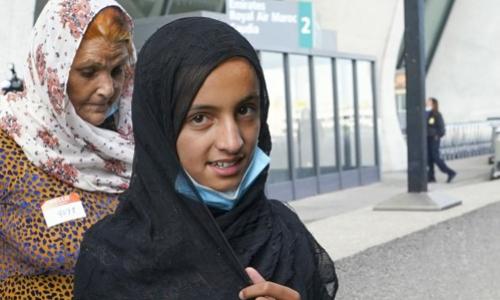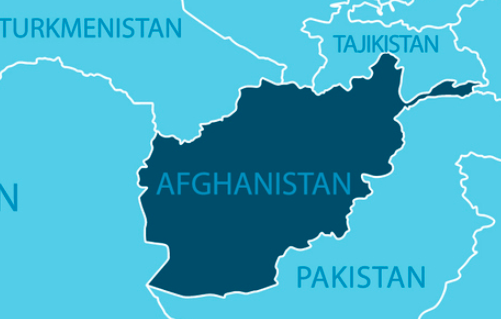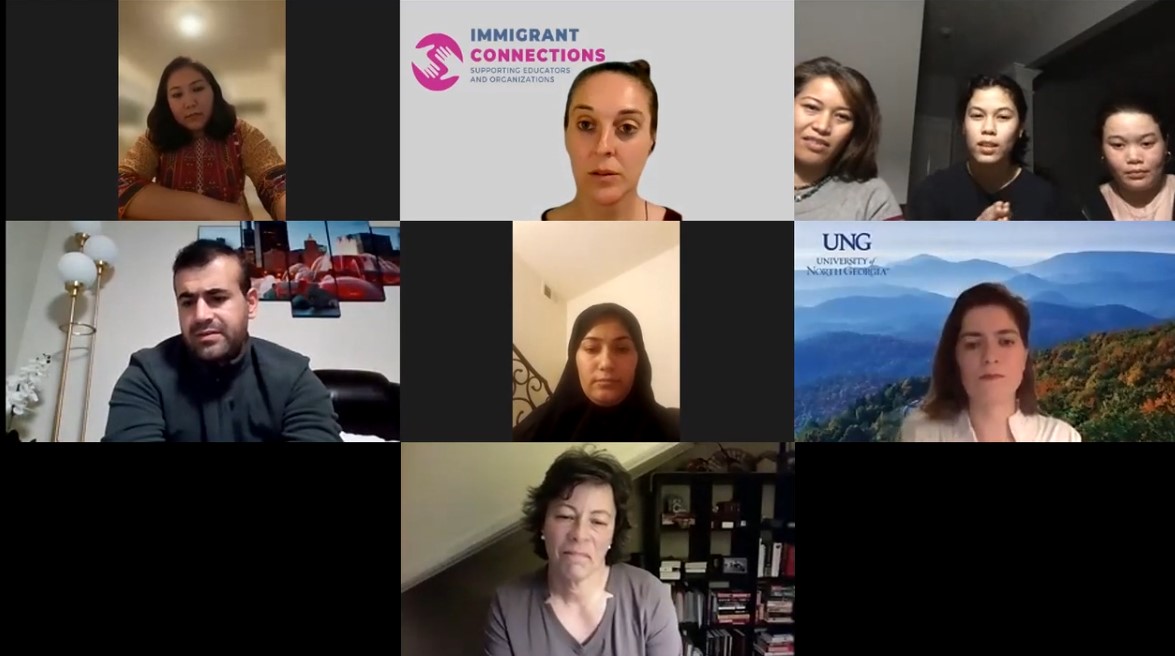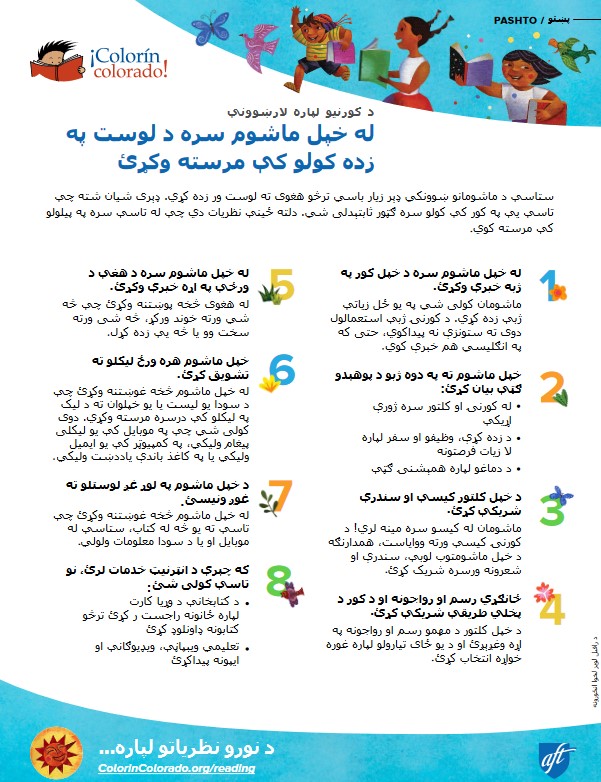How Schools Can Partner with Afghan Refugee Families

The following resources provide recommendations on how schools can effectively partner with families who will be arriving from Afghanistan in the coming months. It also shares lessons learned from schools already partnering with this community.
Image: Afghan refugees arrive at Dulles Airport in Virginia/Reuters
Topics on This Resource Page
This resource collection includes the following sections:
- Afghan Arrivals: What Schools Need to Know
- Featured Resources: Partnering with Afghan Communities
- Updates and Recommended Resources
- Resources for Families
Afghan Arrivals: What Schools Need to Know
Over the coming months tens of thousands of Afghan neighbors will begin arriving in our schools and communities, as a result of the recent political developments in Afghanistan. Many of the newcomers have served as interpreters, translators, educators, and additional support staff for U.S. military operations. Additionally, many Afghan families are seeking asylum. In addition, some children are arriving alone, without family members.
Where will Afghan families be resettled?
The U.S. State Department will recommend a list of cities for Afghans who are looking to resettle based on different factors. According to the State Department, families may allow a resettlement agency to match them to a location based on criteria such as:
- Cost of living
- Housing availability
- Employment opportunities
- Access to resettlement support services
- Access to additional resettled communities for support
It's important to note that many refugee resettlement services are still increasing capacity after refugee services were cut in prior years.
Educators who are working with new Afghan arrivals should be sure to contact local resettlement agencies and organizations to further strengthen support around issues such as schooling, housing, medical care, employment, and social-emotional support. It's also important to understand the different kinds of support Afghan families may receive and how long that support will last; in some cases, there are timelines or deadlines that impact what resources families can access. (See more in the Migration Policy Institute report below.)
For additional recommendations for partnering with Afghan families during this transition, please see these tips from the Austin Independent School District, as well as our tips for supporting refugee students.
Learn more about the Afghans who are coming from the following stories and reports:
- Afghan Immigrants in the United States: Fall 2021 (Migration Policy Institute)
- Different Statuses, Different Benefits: Determining Federal Assistance for Afghan Evacuees (Migration Policy Institute)
- Afghans arriving in the U.S. look to the future (International Rescue Committee)
- Explainer: Who are the Afghan refugees coming to the U.S. and what happens when they arrive? (Reuters)
- Explainer: What’s happening with Afghanistan evacuations? (AP News)
- Afghan Refugee Crisis Explained (UNHCR)
Featured Resources: Partnering with Afghan Communities
Welcoming Afghan Families: Lessons Learned from Austin

Learn how Austin ISD, the public school district in Austin, TX, is currently partnering with the Afghan community and preparing to welcome the additional Afghan families who will be arriving in their schools in coming months.
Webinar: Afghan Refugee Students & Families Talk About Educational Experiences of Afghans
 This webinar from Immigrant Connections includes a conversation with students and parents who have immigrated from Afghanistan, as well as researchers who are studying the educational experiences of Afghan students. The webinar is free and participants are invited to make a small donation to pay panelists for their time.
This webinar from Immigrant Connections includes a conversation with students and parents who have immigrated from Afghanistan, as well as researchers who are studying the educational experiences of Afghan students. The webinar is free and participants are invited to make a small donation to pay panelists for their time.
See more information in Immigrant Connections' Resources to Orient Afghans to K-12 Education in the U.S.
Books for Children and Teens: Afghan Voices
 The following books bring a wide range of Afghan stories and voices to life. While they present a variety of themes and settings, they capture the resilience, spirit, and warmth of the Afghan people.
The following books bring a wide range of Afghan stories and voices to life. While they present a variety of themes and settings, they capture the resilience, spirit, and warmth of the Afghan people.
These books can be used to support school and community discussions of current events related to Afghanistan.
Updates and Recommended Resources
Personal stories
How schools can support Afghan students
- Young Afghan Refugees in America Adjust to New Norms -- Especially for Girls (The 74)
- How Can Schools Help to Welcome Young Afghan Newcomers? (EdSurge)
- Here's How Schools Are Helping Afghan Refugee Students (Education Week)
- Educators Must 'Walk Alongside Afghans and Support Them' (Education Week)
- 12 Ways to Support Afghan Refugee Students (Education Week)
- How are school districts easing the transition for Afghan students? (K-12 Dive)
- As Afghan refugees arrive in the U.S., Southeast Asian advocate for more support (PBS NewsHour)
- Fairfax, VA Schools Lean on Experience to Prepare for Afghan Refugees (Inside NoVA)
Updates and explainers
- Some Afghan children are arriving in the U.S. without family members (CBS News)
- They came to the U.S. as Afghan refugees. Now they hope their story will help others (NPR)
- Afghans arriving in the U.S. look to the future (International Rescue Committee)
- Waves of Afghan refugees are arriving in the U.S. Here is some help they can expect (NPR)
- Explainer: Who are the Afghan refugees coming to the U.S. and what happens when they arrive? (Reuters)
- EXPLAINER: What’s happening with Afghanistan evacuations? (AP News)
- Afghan Refugee Crisis Explained (UNHCR)
- Helpful Resources for the Afghanistan Transition (Military Child Education Coalition)
Classroom resources
- Daily News Lesson: Afghan refugees face bureaucratic hurdles in coming to the U.S. (PBS NewsHour Extra)
- Commemorating 9/11: Including ELLs
What you can do
- How you can help Afghan refugees arriving in the U.S. (PBS NewsHour)
- How to help Afghan refugees and those still in Afghanistan (The Washington Post)
- Waves of Afghan refugees are arriving in the U.S. Here is some help they can expect (NPR)
How to partner with refugee students and families
- Using a Strengths-Based Approach with ELs: Supporting Students Living with Trauma, Violence and Chronic Stress
- How to Support Refugee Students in Your School Community
- You Are Welcome Here: Supporting the Social-Emotional Health of Newcomer Immigrants
Resources for Families
Tip sheets in in Pashto
 Some of our tip sheets are available in Pashto, one of the languages spoke in Afghanistan.
Some of our tip sheets are available in Pashto, one of the languages spoke in Afghanistan.
Help Your Child Learn to Read
These literacy tips are available in a tip sheet and social media graphics.
How to Support Your Child's Social-Emotional Health
These tips for families highlight ideas for supporting students' well-being.






